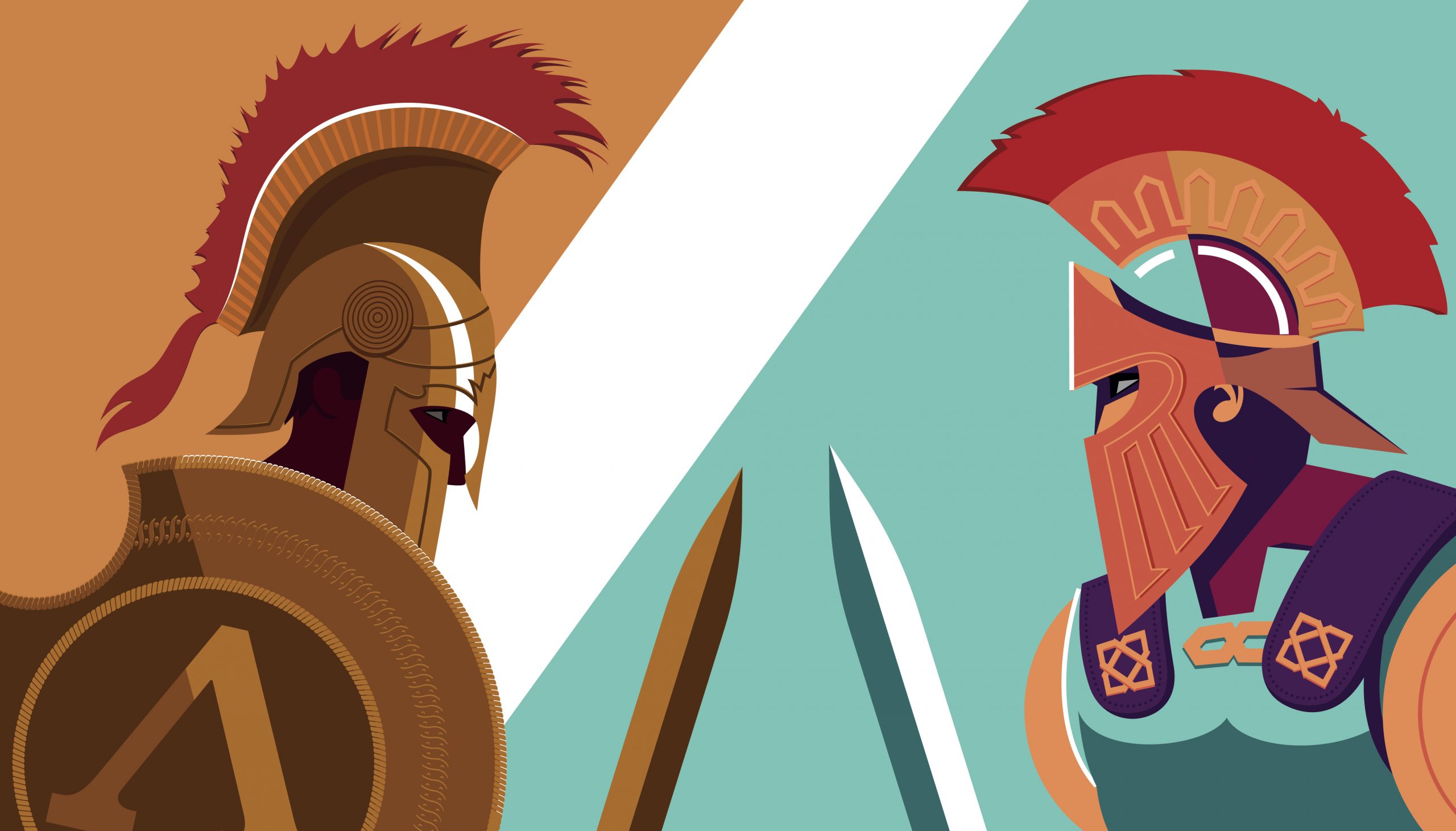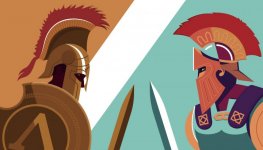Menu
Install the app
How to install the app on iOS
Follow along with the video below to see how to install our site as a web app on your home screen.
Note: This feature may not be available in some browsers.
You are using an out of date browser. It may not display this or other websites correctly.
You should upgrade or use an alternative browser.
You should upgrade or use an alternative browser.
Greek Mythology Community
What was Agamemnons role in the Trojan war?
- Thread starter acamp7
- Start date
1 - 3 of 3 Posts
knicks_fan87
Active member
Agamemnon is said to have gotten together an army of princes and they set sail for Troy only to incur the wrath of goddess Artemis.
k_tsoukalas
Administrator
Here is a good article about this!

 www.greekboston.com
www.greekboston.com

Agamemnon’s Role During the Trojan War
Learn all about Agamemnon's role in the Trojan War.
1 - 3 of 3 Posts
JOIN THE DISCUSSION AND READ OTHER GREEK INFO:
Summary of the Nine Muses of Greek Mythology
- d_kakavouli
- Greek Mythology Forum
- Replies: 1
I've been studying about Greek Mythology and I bumped into some information about the 9 muses. I thought I would give a summary of who they are and what they represented. I feel like the Muses are often forgotten!
In Greek mythology, the Muses were goddesses who presided over the arts and sciences, inspiring creativity and knowledge in humans. There were originally nine Muses, each with her own domain of expertise. Here's a summary of who they were:

In Greek mythology, the Muses were goddesses who presided over the arts and sciences, inspiring creativity and knowledge in humans. There were originally nine Muses, each with her own domain of expertise. Here's a summary of who they were:
- Calliope: The Muse of epic poetry and eloquence. She was often depicted with a writing tablet or a scroll.
- Clio: The Muse of history. She was often depicted holding a scroll or a set of tablets, symbolizing the recording of historical events.
- Euterpe: The Muse of music, song, and lyric poetry. She was often depicted holding a flute or a double flute.
- Thalia: The Muse of comedy and bucolic poetry. She was often depicted with a comic mask, a shepherd's crook, or a wreath of ivy.
- Melpomene: The Muse of tragedy. She was often depicted holding a tragic mask and a sword or club.
- Terpsichore: The Muse of dance and choral poetry. She was often depicted holding a lyre and dancing.
- Erato: The Muse of love poetry and lyric poetry. She was often depicted holding a lyre and a wreath of roses.
- Polyhymnia: The Muse of sacred poetry, hymns, and eloquence. She was often depicted in a pensive or meditative pose, sometimes holding a finger to her lips.
- Urania: The Muse of astronomy and astrology. She was often depicted holding a globe and a compass, symbolizing the study of celestial bodies and their movements.

Accurate movies about Greek mythology?
- acamp7
- Greek Mythology Forum
- Replies: 1
I am looking for some "accurate" movies that have Greek mythological topics. I say "accurate" because how can we really even know? Many of the stories were handed down through the generations, and some even may have been lost. I guess I mean accurate according to what has been established from works that have survived.
I found this video - has anyone watched these?
I found this video - has anyone watched these?
List of fun Greek mythology topics
- nadellii
- Greek Mythology Forum
- Replies: 1
I really love Greek Mythology. I thought I would share with you all some of my favorite topics:
- Birth of the Olympians and how they came to power
- Different heroes of Greek mythology
- 12 Labors of Hercules
- Trojan War
- Iliad and the Odyssey and all the stories in them
- The story of Persephone
- Pandora's box
- Different creatures - like the Minotaur and Hydra
12 Olympian Gods and Goddesses
- ssherie_
- Greek Mythology Forum
- Replies: 1
I love mythology and I thought I'd make list of the 12 Olympian Gods and Goddesses. This is my best guess. Do you know that I have seen different versions of this? What do you think?

- Zeus: The king of the gods, ruler of the sky and thunder, and the god of law, order, and justice.
- Hera: The queen of the gods, Zeus's wife and sister, and the goddess of marriage and childbirth.
- Poseidon: The god of the sea, earthquakes, and horses, often depicted with a trident.
- Demeter: The goddess of agriculture, fertility, and the harvest, responsible for the cycle of life and death in crops.
- Athena: The goddess of wisdom, warfare, strategy, and crafts, often associated with strategic warfare and civilization.
- Apollo: The god of music, poetry, prophecy, healing, and archery, known for his wisdom and beauty.
- Artemis: The goddess of the hunt, wilderness, childbirth, and virginity, often depicted with a bow and arrows.
- Ares: The god of war, violence, and bloodshed, embodying the brutal aspects of conflict.
- Aphrodite: The goddess of love, beauty, pleasure, and procreation, born from the sea foam and known for her irresistible charm.
- Hephaestus: The god of fire, blacksmiths, craftsmen, and volcanoes, renowned for his skill in metalworking.
- Hermes: The messenger of the gods, associated with travel, commerce, communication, and trickery.
- Dionysus: The god of wine, fertility, ecstasy, and theatre, representing the joyous aspects of life and celebration.

Thesmorphia - Ancient Greek Thanksgiving Festival
- cubrinj
- Greek Mythology Forum
- Replies: 1
I have heard this festival described as an "Ancient Greek Thanksgiving" so I thought I would look it up. Very interesting! I don't see the "Thanksgiving" connection (not the way we in the US think of it) but I thought it was interesting because it goes to show you that gratitude-related festivals are an ancient concept. And it is a harvest festival, just like our US Thanksgiving is...
Some information I have gathered:
The Thesmorphia festival was celebrated on the 11th of Pyanepsion, which corresponds to late October or early November in the modern Gregorian calendar. The festival was a three-day affair, and it was observed mainly by women. During the festival, women were not allowed to sleep with their husbands, and purification rituals were performed at the temples of Demeter and Persephone. On the first day, the first fruits of the harvest were offered to Demeter, and a feast was held in her honor. On the second day, a procession was held, and women walked around the fields carrying torches, symbolizing the power of Demeter. The third day was a joyous celebration, and the remnants of the feast were donated to the poor.
The Thesmorphia festival was significant for many reasons. Firstly, it celebrated the end of the harvesting season, and it was a time to give thanks for a good crop. The festival was also a time for women to come together, and it was an opportunity for them to assert their power and influence in the society. Women played a significant role in the festival, and they were responsible for the preparation of the feast and various other aspects of the festival.
The festival was also significant in terms of its religious and mythological significance. Demeter was the goddess of agriculture, and Persephone was her young daughter, who was kidnapped by Hades, the god of the underworld. The story of Persephone reflects the cycle of life, death, and resurrection. The festival of Thesmorphia was an opportunity to honor these two goddesses and their mythology, which highlighted the importance of the harvest and the cycle of life.
Another reason why the Thesmorphia festival was significant was that it was a time for the community to come together and celebrate. The feast was an opportunity to share food, drink, and stories and build camaraderie amongst members of the community. During the festival, people forgot their differences and came together to celebrate the bounty of the harvest.
Some information I have gathered:
The Thesmorphia festival was celebrated on the 11th of Pyanepsion, which corresponds to late October or early November in the modern Gregorian calendar. The festival was a three-day affair, and it was observed mainly by women. During the festival, women were not allowed to sleep with their husbands, and purification rituals were performed at the temples of Demeter and Persephone. On the first day, the first fruits of the harvest were offered to Demeter, and a feast was held in her honor. On the second day, a procession was held, and women walked around the fields carrying torches, symbolizing the power of Demeter. The third day was a joyous celebration, and the remnants of the feast were donated to the poor.
The Thesmorphia festival was significant for many reasons. Firstly, it celebrated the end of the harvesting season, and it was a time to give thanks for a good crop. The festival was also a time for women to come together, and it was an opportunity for them to assert their power and influence in the society. Women played a significant role in the festival, and they were responsible for the preparation of the feast and various other aspects of the festival.
The festival was also significant in terms of its religious and mythological significance. Demeter was the goddess of agriculture, and Persephone was her young daughter, who was kidnapped by Hades, the god of the underworld. The story of Persephone reflects the cycle of life, death, and resurrection. The festival of Thesmorphia was an opportunity to honor these two goddesses and their mythology, which highlighted the importance of the harvest and the cycle of life.
Another reason why the Thesmorphia festival was significant was that it was a time for the community to come together and celebrate. The feast was an opportunity to share food, drink, and stories and build camaraderie amongst members of the community. During the festival, people forgot their differences and came together to celebrate the bounty of the harvest.
Share and discuss Greek mythology!
WorldwideGreeks.com is a free online forum community where people can discuss Greek food, travel, traditions, history and mythology.
Join Worldwide Greeks here!
Join Worldwide Greeks here!
JOIN COMMUNITY FOR FREE
LOGIN TO YOUR ACCOUNT



